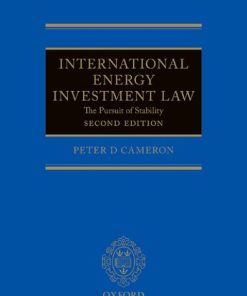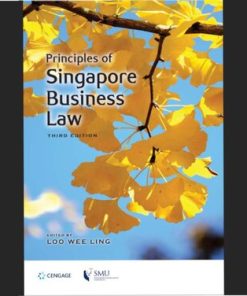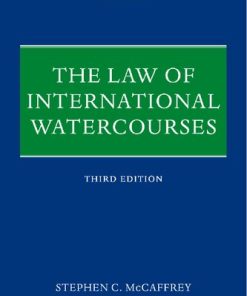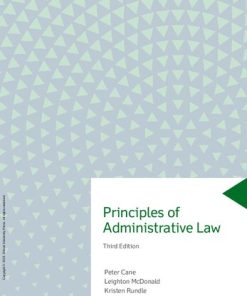(EBook PDF) Principles of International Investment Law 3rd edition by Rudolf Dolzer, Ursula Kriebaum, Christoph Schreuer 019267241X 9780192672414 full chapters
$50.00 Original price was: $50.00.$25.00Current price is: $25.00.
Principles of International Investment Law 3rd edition by Rudolf Dolzer, Ursula Kriebaum, Christoph Schreuer – Ebook PDF Instant Download/DeliveryISBN: 019267241X, 9780192672414
Full download Principles of International Investment Law 3rd edition after payment.
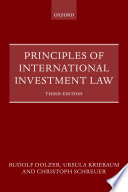
Product details:
ISBN-10 : 019267241X
ISBN-13 : 9780192672414
Author: Rudolf Dolzer, Ursula Kriebaum, Christoph Schreuer
This book outlines the principles behind the international law of foreign investment. The main focus is on the law governed by bilateral and multilateral investment treaties. It traces the purpose, context, and evolution of the clauses and provisions characteristic of contemporary investment treaties, and analyses the case law, interpreting the issues raised by standard clauses. Particular consideration is given to broad treaty-rules whose understanding in practice has mainly been shaped by their interpretation and application by international tribunals. In addition, the book introduces the dispute settlement mechanisms for enforcing investment law, outlining the operation of Investor-State arbitration. Combining a systematic analytical study of the texts and principles underlying investment law with a jurisprudential analysis of the case law arising in international tribunals, this book offers an ideal introduction to the principles of international investment law and arbitration, for students, scholars, and practitioners alike.
Principles of International Investment Law 3rd Table of contents:
I. History, Sources, and Nature of International Investment Law
1. The history of international investment law
(a) Early developments
(b) The emergence of an international minimum standard
(c) Developments after the Second World War
(d) The evolution of investment protection treaties
(e) The quest for a multilateral framework
(f) Recent developments
2. The sources of international investment law
(a) The ICSID Convention
(b) Bilateral investment treaties
(c) Sectoral and regional treaties
(d) Customary international law
(e) General principles of law
(f) Unilateral statements
(g) Case law
3. The nature of international investment law
(a) Investment law and trade law
(b) Balancing duties and benefits
(c) The investor’s perspective: a long-term risk
(d) The host State’s perspective: attracting foreign investment
(e) International investment law and sovereign regulation
(f) International investment law and good governance
(g) Obligations for investors
II. Interpretation and Intertemporal Application of Investment Treaties
1. The interpretation of investment treaties
(a) The general rule of treaty interpretation
(b) Travaux préparatoires
(c) The relevance of other treaties
(d) Interpretative statements
(e) The authority of ‛precedents’
(f) Towards a greater uniformity of interpretation
2. Application of investment treaties in time
(a) The date relevant to determine jurisdiction
(b) The timing of investments, events, and disputes
(c) Applicable law and jurisdiction
(d) Relevant dates under the ICSID Convention
III. Investor
1. Private foreign investors
2. Nationality of individuals
3. Nationality of corporations
4. A local company as a foreign investor
5. Nationality planning
6. Denial of benefits
7. An active investor?
IV. Investment
1. Terminology and concept
2. Definitions of investment
(a) Investment contracts
(b) Definitions in national laws
(c) Definitions in treaties
3. A general concept of investment?
(a) ‘Investment’ in Article 25 of the ICSID Convention
(b) The Salini test
4. Types of investments
(a) Tangible assets
(b) Contract rights
(c) Shareholding
(d) Financial instruments
(e) Intellectual property rights
(f) Arbitral awards
5. The unity of an investment
6. The origin of the investment
7. Investments in the host State’s territory
(a) Financial instruments
(b) Pre-shipment inspections
(c) Transboundary harm
8. Investment in accordance with host State law
(a) Illegality in contract-based disputes
(b) Illegality in disputes based on domestic legislation
(c) Illegality in treaty-based disputes
(d) Illegality in making the investment
(e) The nature of the violated rules
(f) Severity of the violation
(g) Toleration of illegality by the host State
(h) Illegalities committed by the host State
9. Indirect investments
(a) Customary international law
(b) Shareholding as a form of investment
(c) Minority shareholding
(d) Indirect shareholding
(e) The nature of the protected rights
V. Investment Contracts
1. Types of investment contracts
2. Applicable law
3. Dispute settlement
4. Stabilization clauses
5. Renegotiation and adaptation
6. Relationship to investment treaties
VI. Admission and Establishment
1. The right to control admission and establishment
2. The move towards economic liberalism
3. Investment promotion
4. The right to admission and the right of establishment
5. Treaty models of admission
(a) The admission clause model
(b) The right of establishment model
6. Performance requirements
7. The inception of an investment
(a) Pre-investment activities
(b) The existence of investment activities
VII. Expropriation
1. The object of an expropriation
(a) Expropriation of contract rights
(b) Partial expropriation
2. Expropriation as an act of government
3. Indirect expropriation
(a) Broad formulae
(b) Some illustrative cases
(c) Severity of the deprivation
(d) Duration of a measure
(e) Loss of control
(f) Effect or intention?
(g) Legitimate expectations
(h) Regulatory measures
(i) Creeping expropriation
4. The legality of an expropriation
VIII. Standards of Protection
1. Fair and equitable treatment
(a) Introduction
(b) History
(c) Textual variations
(d) Definitions of fair and equitable treatment
(e) Relationship of FET to other standards
(f) Fair and equitable treatment and customary international law
(g) Specific applications of the fair and equitable treatment standard
aa. Stability and consistency
bb. Legitimate expectations
cc. Transparency
dd. Compliance with contractual obligations
ee. Procedural propriety and due process
ff. Application of domestic law
gg. Freedom from coercion and harassment
hh. Good faith
(h) Composite acts
(i) Conclusion
2. Full protection and security
(a) Concept
(b) The standard of liability
(c) Protection against physical violence and harassment
(d) Legal protection
(e) Relationship to customary international law
3. Arbitrary or discriminatory measures
(a) Introduction
(b) Textual variations
(c) The meaning of ‘arbitrary’
aa. Rational decision-making
bb. Rule of law
cc. Adverse intention
dd. Due process
(d) The meaning of ‘discriminatory’
aa. The basis of comparison
bb. Discriminatory intent
4. National treatment
(a) General meaning
(b) The basis of comparison: like circumstances
(c) Less favourable treatment
(d) Is there a justification for the differentiation?
(e) The relevance of discriminatory intent
(f) The relevance of WTO case law
(g) Burden of proof
5. Most-favoured-nation treatment
(a) Introduction
(b) The ejusdem generis rule
(c) The scope of MFN clauses
(d) Variations of MFN clauses
(e) MFN and substantive rights
6. The umbrella clause
(a) Meaning and origin
(b) Effective application of umbrella clauses
(c) Restrictive application of umbrella clauses
(d) Umbrella clauses and privity of contract
(e) Umbrella clauses and unilateral undertakings
7. Effective means
8. Transfer of funds
(a) Monetary sovereignty
(b) Types of covered transfers
(c) Inward and outward transfers
(d) Transfers in accordance with host State law
(e) Currencies, exchange rates, and delay
(f) Restrictions
IX. Emergency Situations and Armed Conflicts
1. Competing policies
2. Effects of violence under traditional international law
3. The ILC Articles on State Responsibility
(a) Necessity
(b) Force majeure
4. Treaty law
(a) Emergencies and armed conflicts in the law of treaties
(b) Treaty provisions dealing with emergencies and armed conflicts
aa. Compensation for losses clauses
bb. Extended war clauses
cc. Security clauses
X. Attribution
1. Sources and principles
2. Organs, provinces, and municipalities
(a) State organs
(b) Provinces and municipalities
(c) The role of domestic law
(d) Legal personality
(e) State ownership
(f) De facto organs
(g) Excess of authority
3. Exercise of governmental authority
(a) Governmental authority
(b) Exercise of governmental authority in the particular instance
4. Instruction, direction, or control
(a) Effective and specific control
(b) Degree of control
(c) Ownership and control
XI. Political Risk Insurance
1. History and purpose
2. Different types of insurance
3. Subrogation
4. Risks covered
5. Disputes between investors and insurers
XII. Settling Investment Disputes
1. State v State disputes
(a) Diplomatic protection
(b) Disputes between States
2. The limited usefulness of domestic courts
3. Settlement of investor–State disputes by arbitration and conciliation
4. Arbitration institutions and regimes
(a) ICSID
(b) ICSID Additional Facility
(c) Non-ICSID investment arbitration
aa. The International Chamber of Commerce
bb. The London Court of International Arbitration
cc. The UNCITRAL Rules
dd. The Iran–United States Claims Tribunal
ee. The Permanent Court of Arbitration
5. Investment disputes
(a) The dispute
(b) The legal nature of the dispute
(c) The directness of the dispute in relation to the investment
(d) The investment
6. The parties to investment disputes
(a) The host State
(b) The investor
(c) The investor’s nationality
(d) The significance of the Additional Facility
7. Consent to investment arbitration
(a) Consent by direct agreement
(b) Consent through host State legislation
(c) Consent through bilateral treaties
(d) Consent through multilateral treaties
(e) The irrevocability of consent
(f) The scope of consent
(g) The interpretation of consent
8. Conditions for the institution of proceedings
(a) Waiting periods for amicable settlement
(b) The requirement to resort to domestic courts
(c) The fork in the road
(d) Waiver clauses
9. MFN clauses and dispute settlement
(a) The wording of MFN clauses
(b) MFN treatment and conditions for the institution of proceedings
(c) MFN treatment and consent
(d) Cherry picking
10. Treaty claims and contract claims
(a) The selection of domestic courts in contracts
(b) Jurisdiction of international tribunals over contract claims
(c) Distinguishing treaty claims from contract claims
11. Procedure
(a) Arbitration rules
(b) Institution of proceedings
(c) Constitution and composition of the tribunal
(d) Provisional measures
(e) Expedited procedure
(f) Written and oral procedure
(g) Default
(h) Settlement and discontinuance
(i) The award
(j) Transparency
(k) Amicus curiae participation
12. Applicable law
(a) Choice of law
(b) Host State law and international law
(c) Special issues of applicable law
13. Remedies
(a) Satisfaction and restitution
(b) Damages for an illegal act
(c) Compensation for expropriation
(d) Interest
14. Costs
15. Review of awards
(a) Review in non-ICSID arbitration
(b) Annulment of awards under the ICSID Convention
aa. Improper constitution of tribunal
bb. Excess of powers
cc. Corruption
dd. Serious departure from a fundamental rule of procedure
ee. Failure to state reasons
(c) Supplementation and rectification under the ICSID Convention
(d) Interpretation under the ICSID Convention
(e) Revision under the ICSID Convention
16. Enforcement of awards
People also search for Principles of International Investment Law 3rd:
borrow principles of international investment law
schreuer principles of international investment law
what are the main principles of international investment law
principles of international investment law third edition
principles of international investment law 2nd edition
Tags:
Principles,International Investment,Law,Rudolf Dolzer,Ursula Kriebaum,Christoph Schreuer
You may also like…
Jurisprudence & Law - Foreign & International Law
Jurisprudence & Law
International Law of Taxation (Elements of International Law) Peter Hongler 9780192653901 0192653903
Uncategorized
International Energy Investment Law: The Pursuit of Stability 2nd Edition Peter Cameron
Uncategorized
Business & Economics - Investing
Custom and its Interpretation in International Investment Law: Volume 2
Jurisprudence & Law - Constitutional Law
Principles of Administrative Law 3rd Edition Peter Cane Leighton Mcdonald Kristen Rundle





